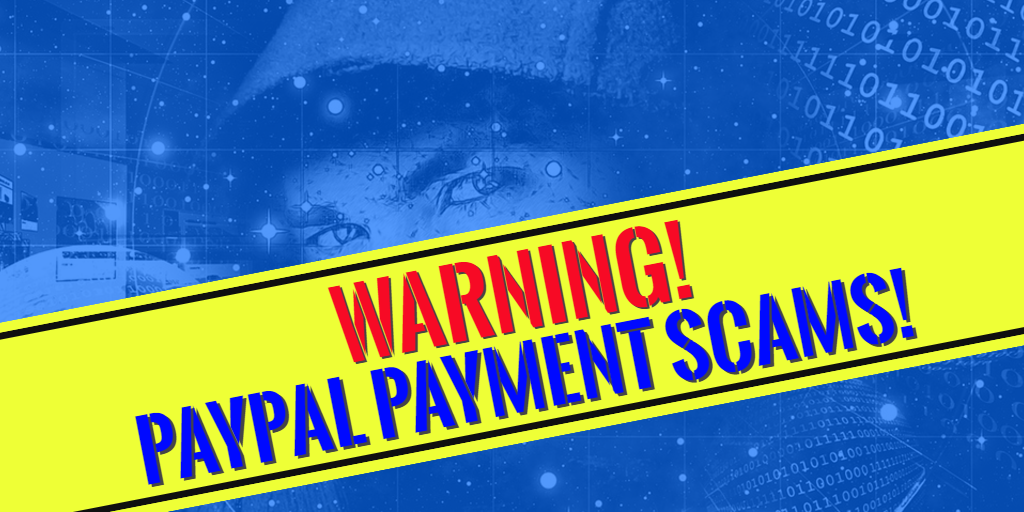![]()
Scams using PayPal payments have been cropping up more and more these days. I’m finding people every day asking about emails they’ve received that they know nothing about, especially from a person called Brian Munch. It’s all because scammers have started faking emails and adding dodgy links to snatch consumers’ personal and bank details. Which they then use to swipe money from your accounts and launder it away.
Why are Scammers using PayPal?
PayPal itself is a great method of payment for products and services over the Internet and is becoming a very popular method of buying and selling over the Internet. More companies are setting up their online payment methods as PayPal rather than card payments. I am also beginning to see more Takeaways and delivery services start to utilise this payment method as well.
This is mainly because PayPal also offers a buyer protection policy and a seller protection policy
PayPal Buyer and Seller Protection description, taken from the PayPal Website: https://www.paypal.com/uk/webapps/mpp/paypal-safety-and-security
These are created to protect us but unfortunately, as long as there is a way of paying and receiving money online there will always be people who think it’s acceptable to find ways to use these systems to con people out of their money. Scammers will find any possible way to cheat and steal and they are getting more and more imaginative. Below are a few methods I have been looking into to help protect others from these scammers.
Types of Scams using PayPal Payments!
PayPal Payment Scams
With the protection policies in mind, it doesn’t stop the scammers from trying to find ways of using these protection policies to their advantage. Some simple scams are paying for items through Paypal having the products sent out and the buyer then claiming to Paypal that they haven’t received the goods. Paypal then refunds the money to the buyer and the seller is out of pocket for the money for the product and also no longer has the product. This is not great for the seller and can put people off selling items. Just remember not everyone is dodgy and it’s unfortunate that the people who do scam others, spoil it for the rest.
Personal Experience with the payment scam
It happened to a friend of mine who used to sell quite a lot of stuff over Ebay using Paypal. He sold a set of 3D Goggles that were worth £350 and he made sure he wrapped the unit up so well padded you could have chucked it around and it wouldn’t have been damaged. Yet the buyer claimed that on delivery the unit was smashed. So went through the buyer protection policy and had his money taken out of the seller’s PayPal account and credited back into his. Even though he now had both the goggles and his money back. To this day he still hasn’t sent back the so-called ‘smashed goggles’.
What to Learn How to Make Money instead of Losing Money?
PayPal Over-Payment Scams
This type of scam is targeted at the seller. They look for high-ticket items like cars or jewellery and they will start the purchase process. The buyer then receives a message to say the purchaser has overpaid for the product. the purchaser then tells the seller to send him back the money that was overpaid by. This is the point when the buyer wants a refund as he hasn’t received any goods and he has his money back, the product and also the extra cash you’ve just sent him.
The moral of this scam is if you get any buyer who is paying too much, stop the sale there and then definitely don’t send them the products.
PayPal Phishing Emails
These types of scams are becoming very common unfortunately as all these scammers need are email addresses and they spam enough of these out to hopefully catch a bite and steal your money. The idea of calling it Phishing implies that they are pretending to be a company but are trying to get you to give you personal details.
How to Spot Internet Scams!
You receive emails saying you’ve been sent a payment from a name. In some cases, you could receive this even if you don’t have a PayPal account as they are just spamming emails out to a list of email accounts. The emails look like they are from PayPal and look fairly legit.
The point of these types of emails is they want you to press the ‘cancel the payment‘ button where they will then ask you to put in your login and password for your PayPal account. Then once they get that they can take as much money as they like or even use your account to then con someone else out of money in your name. Another big giveaway on these emails is they sometimes don’t even have PayPal logos anywhere on the email but people still click the links.
Remember as I have said in many posts before signs of scammers are the lack of attention to detail. Sometimes you’ll get typing errors or in this case a missing company logo.
Don’t Press any links on these types of emails. Even if it’s from your bank, just close the email and log in to your account on your browser to make sure the connection is clean.
Tips on Staying Safe
1. Look for images that aren’t clear like the PayPal logo, like the images being slightly blurry. Sure sign the email is fake!
2. If it doesn’t feel right don’t follow it up or click on any link within the email
3. Close any emails and log in through your own internet browser
4. If you are still not sure call PayPal customer care
5. Don’t type in your details on anything apart from the actual site after logging in manually through your own internet browser
6. Anything that seems too good to be true, usually is!
Your Defence From Malicious Emails!
Anti-Virus Software!
It is always recommended to have some sort of Anti-Virus software on your PC or Laptop will always help to keep you safe from clicking on anything. In case by clicking you end up downloading a virus or other software that will damage your PC or even watch what you type and start taking your personal logins and details.
Hi, I’m Graham, I’m the creator and founder of grahamhodsdon.com. If you have come across any of these scams using PayPal payments then please share your experiences in the comments below and let’s help others not to get caught out by these types of Scammers. Thank’s for reading.


Hi Graham!
This is Juan Moreno-Hernandez from WA. I want to share a scam experience. In my Facebook account (Everything Vs Diabetes), some people started posting some puzzles (Like a number series where they ask for a missing number) and promising cash to the winner. If you answer, they ask you for a paypal, cashback or other type of platforms where they can deposit the promised money. I was intrigued due to the number of petitions like that and even answered and follow one of them. Very insisting and when I told I was affraid it was a scam, she (was a girl), sent me three short videos of people that had cashed their prize. As you said, too good to be true!. I am planning to block these scamers.
Hi Juan Moreno-Hernandez, it’s a pleasure to be on this journey with you. Thanks for sharing your experience with this scam, I haven’t come across this one yet. So I will definitely have a good look into this one and make sure I get an article out about it. The more experiences we share together, the more aware we can keep everyone. This way we can stay one step ahead of the scammers. Have a great weekend and thanks again I really appreciate your support.